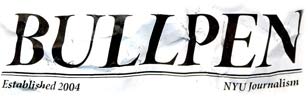Lecture: Nancy Shute
RELATED:
It’s Wednesday, August 31, 2005, two days after Hurricane Katrina made landfall in New Orleans, and hospital workers are beginning to panic. Trapped in Charity Hospital, victims of the massive storm are waiting for help. The workers can hear banging on the roof, and fear it may be the gunfire they’ve been hearing about on the radio, their only link to the outside world. They’re out of food and water, and are running desperately low on medical supplies. At last, the phone they’ve used countless times, calling for help, rings. On the other end is Nancy Shute, a senior writer for US News & World Report.
“We are so afraid,” a distraught nurse told Shute. “We are trapped here. We can’t get a hold of anybody. We don’t have food, water or medicine—we are afraid we are all going to die!”
Shute recalled the conversation on April 26, during the final installment of NYU’s “Inside Out” speaker series, sponsored by the Department of Journalism’s Science, Health and Environmental Reporting Program, and moderated by Lee Hotz of the Los Angeles Times.
Dispatched to report on the state of New Orleans’s medical situation in the aftermath of Katrina, Shute soon realized it wasn’t going to be easy. She began by calling all the hospitals in the city, but no one answered. Eventually, she followed a lead from a relative of a Charity Hospital nurse, and was surprised to hear a frantic worker on the other end of the line. In the days that followed, Shute kept in close contact with the nurse, April Fugere, trying to get help for the patients and staff trapped in the hospital. It took five grueling days for them to be rescued. As the drama unfolded, Shute kept the public up-to-date on the condition of those still trapped inside the hospital by posting updates on USN&WR’s website.
Today, almost a year after the devastating storm, the medical situation in New Orleans is still dire, according to Shute, who returned to New Orleans in March for USN&WR to report on the city’s attempts to repair its battered medical facilities. Before she arrived, she made plans to speak with doctors, patients, and public relations officers from several hospitals—a process she says was “very difficult,” because of the city’s impaired telecommunications systems. “I arranged to meet with this doctor in Baton Rogue,” says Shute. “He didn’t show up, and he wasn’t answering his cell. He was living in his car. What do you do when a source lives in his car?” The doctor showed up two hours late, very apologetic. Worn down and exhausted, he’d fallen asleep.
On her two-day trip, Shute toured many of the city’s makeshift hospital facilities. She asked doctors and hospital officials what kind of emergency financial assistance they were getting. They said they weren’t getting the money necessary to provide quality healthcare. Like any tenacious reporter, Shute decided to follow the money. From her sources, she learned that the emergency funds allocated for healthcare weren’t getting to the institutions that needed them. Instead, she claims, they were ending up in the state’s coffers. “Basically, a big chunk of money fell in the state of Louisiana’s lap,” she said. “[The state government] didn’t want to let the money go and they just said, ‘Good luck, hospitals!’” Shute began to realize that promoting public awareness of the state government’s role in siphoning off desperately needed funds was essential to ensuring that the citizens of The Big Easy received proper healthcare.
In her story, “New Orleans’s Against-The-Odds Struggle To Care For The Infirm,” which ran in the April 24 issue of US News & World Report, Shute reported on the dismal state of healthcare in the city. “It is a huge responsibility to report on this accurately,” she told her audience at NYU. “It is my job to get the perspective from the people I spoke to down there, then come back [and] get the numbers and statistics on the whole situation, to give the readers some idea of what’s happening there.” According to Shute, much of the media was guilty of exaggerating reports of gun battles in New Orleans—reports that dissuaded the Charity Hospital staff from seeking rescue on the rooftop.
After Katrina hit, Shute was a lifeline for the Charity Hospital workers. “They were so thankful,” Shute said. “It was the least I could [do]. I wish I could have done more than post something on the Internet. Charity [Hospital] had the only Level 1 trauma center, and now they don’t have any.” The hospital is currently running a makeshift clinic out of an abandoned Lord & Taylor department store, Shute said. The veteran reporter told her audience that she found it hard to believe that “real medicine,” normally conducted in sterile operating rooms and well-stocked emergency rooms, could be practiced under such conditions. Even harder to believe, she suggested is the fact that a once state-of-the-art U.S. hospital is now a maze of tents in a dilapidated department store. “Things are still really not OK in [New Orleans],” said Shute.

